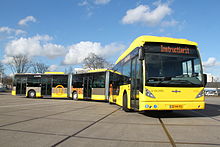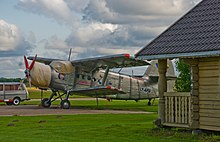Airports[edit]
Kaunas International Airport (KUN) is one of the biggest airports in the Baltic states. In 2010 it handled 809,732 passengers and 4,449 tonnes of cargo. An Irish low-cost airline Ryanair announced Kaunas Airport as their 40th base and first in the Central Europe in February 2010.[72] Kaunas Airport was the fastest growing airport in the Baltic states in 2009 and 2010. The smaller S. Darius and S. Girėnas Airport, established in 1915, is located about three kilometres (1.9 miles) south of the city centre. It is one of the oldest still functioningairports in Europe used for tourism and air sports purposes and now hosts the Lithuanian Aviation Museum.
Highways[edit]
Kaunas is served by a number of major motorways. European route E67 is a highway running from Prague in the Czech Republic toHelsinki in Finland by way of Poland, Kaunas Lithuania, Riga (Latvia), and Tallinn (Estonia). It is known as the Via Baltica between Warsawand Tallinn, a distance of 670 km (416 mi). It is the most important road connection between the Baltic states. Kaunas also is linked toVilnius to its east and Klaipėda, on the Baltic Sea, via the A1 motorway and Daugavpils (Latvia), via E262(A6) highway.
Bridges[edit]
Since Kaunas is located at the confluence of two rivers, there were 34 bridges and viaducts built in the city at the end of 2007, including:
- Vytautas the Great Bridge, connecting Old Town with Aleksotas across the Nemunas;
- M. K. Čiurlionis Bridge, an automotive bridge across the Nemunas;
- Lampėdžiai Bridge across the Nemunas that serves as western bypass of Kaunas;
- Petras Vileišis Bridge, connecting Old Town with Vilijampolė across the Neris River;
- Varniai Bridge, connecting Žaliakalnis with Vilijampolė across the Neris River;
- The Green railway bridge, built in 1862.
Railways[edit]
Kaunas is an important railway hub in Lithuania. First railway connection passing through Kaunas was constructed in 1859–1861 and opened in 1862.[73] It consisted of Kaunas Railway Tunnel and the Railway bridge across the Nemunas river. Kaunas Railway Station is an important hub serving direct passenger connections to Vilnius and Warsaw as well as being a transit point of Pan-European corridors I and IX. Some trains run from Vilnius to Šeštokai, and, Poland, through Kaunas. International route connecting Kaliningrad, Russia and Kharkiv, Ukraine, also crosses Kaunas. The first phase of the Standard gauge Rail Baltica railway section from Šeštokai to Kaunas is under construction, and it is expected to be completed by 2013.[needs update]
Hydrofoil[edit]
There used to be a hydrofoil route serving Nida port through Nemunas and across Curonian Lagoon. It has been repeatedly discontinued and reopened, so the most current status is unclear. The company still exists and have its boats in working condition.[74]
Public transportation[edit]
The public transportation system is managed by Kauno viešasis transportas (KVT).[75] There are 16 trolleybus routes, 37 bus routes.[76] In 2007 new electronic monthly tickets began to be introduced for public transport in Kaunas. The monthly E-ticket cards may be bought once and might be credited with an appropriate amount of money in various ways including the Internet. Previous paper monthly tickets were in use until August 2009.[77] Kaunas is also one of the major river ports in the Baltic States and has two piers designated for tourism purposes and located on the banks of Nemunas river and Kaunas Reservoir – the largest Lithuanian artificial lake, created in 1959 by damming the Nemunas near Kaunas and Rumšiškės.[78] In 2015, Kauno autobusai bought four Van Hool AGG300 to serve the mostly populated 37th route. These are the longest buses used in the Baltic states.[79]
Sports[edit]
Sports in Kaunas have a long and distinguished history. The city is home to a few historic clubs such as: LFLS Kaunas football club (est.1920), LFLS Kaunas baseball club (est.1922), Žalgiris basketball club (est.1944). Ice hockey was first played in Lithuania in 1922. The first Lithuanian ice hockey championship composed of four teams (LFLS, KSK, Kovas, and Macabi) was held in Kaunas, in 1926.[80]
Kaunas is home to some historic venues such as: the main stadium of the city – S.Dariaus ir S.Girėno Sporto Centras (total capacity 9,000), which is also the Lithuanian soccer club FBK Kaunas's and Lithuanian national football team home stadium established in 1923, and Kaunas Sports Hall, completed in 1939 for the Third European Basketball Championship. S.Dariaus and S.Girėno Stadium is also used as the only large athletics stadium in Lithuania.
The university status Lithuanian Academy of Physical Education, founded during the Interwar period, is the only state-supported institution of tertiary physical education in Lithuania. The National Football Academy – the national centre for the training of the best Lithuanian young players of football was established in Kaunas in 2006.
Žalgiris basketball club, one of Europe's strongest basketball clubs, now plays in the Euroleague. Kaunas has also hosted the knockout stage of the European Basketball Championship of 2011. The largest indoor Žalgiris Arena in the Baltics has just been completed in Kaunas. The arena is used to host sports games as well as concerts. The city is also the birthplace or childhood home of many of the country's top basketball stars, among them Arvydas Sabonis, Šarūnas Marčiulionis, Žydrūnas Ilgauskas, Linas Kleiza,Donatas Motiejūnas and Šarūnas Jasikevičius.
Granitas Kaunas is the strongest and most prominent men team handball club in Lithuania. The first golf club "Elnias" in Lithuania was opened in Kaunas in 2000. Nemuno žiedasis the only in Lithuania motor racing circuit, situated in Kačerginė, a small town near Kaunas. A yacht club operates in the Kaunas Reservoir Regional Park.












